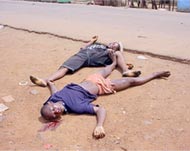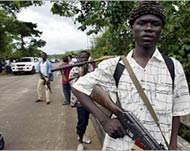Liberia to hold first post-civil war poll
Liberia’s first elections since the end of a brutal civil war will pit millionaire football star George Weah against a Harvard-educated economist, former local commanders and rich lawyers.

Among the ruined concrete tower blocks and muddy shanty towns of the capital, Monrovia, many Liberians see the elections as a historic opportunity to escape a cycle of violence and poverty that brought the West African nation to its knees.
“I have known nothing, no good life, only war,” said George Kaifa, a 23-year-old student dressed in baggy jeans. “We don’t need war any more. The only way we can get peace is to elect a good president.”
War-torn country
Of the 22 candidates running for the presidency on Tuesday, former AC Milan striker Weah and Ellen Johnson-Sirleaf, a 66-year-old former World Bank economist, are seen as the frontrunners, though no reliable opinion polls are available.
Parliamentary elections are being held on Tuesday.
Also running is former rebel leader Sekou Conneh, whose fighters, many of them children high on drugs, randomly
bombarded Monrovia with mortars before president Charles Taylor went into exile and a peace deal was signed in 2003.
 |
|
The 14-year civil war killed |
The conflict, which ground on for 14 years, killed a quarter of a million people, uprooted almost one-third of the population and devastated what was once one of West Africa’s most successful economies.
“In a way, this election is the rebirth of Liberia,” said Abdulsalami Abubakar, a former Nigerian military ruler and the
chief negotiator in Liberia’s peace process.
“Over the past 15 to 20 years, Liberians have succeeded in destroying this country. This time around they have seen the need to rebuild,” he said.
Prosperous country
The rubber, iron ore, timber and diamonds that fuelled the civil war could once again make Liberia one of the region’s more prosperous states if the resources are well-managed, diplomats and economists say.
 |
|
Many Liberians see the polls as a |
But the country could destabilise the region if its new leaders fail to consolidate the peace and cut the 80%
unemployment rate among a population mostly too young to remember anything but war.
“Liberia has been the epicentre of progressive waves of instability that have swept through this region over the past 25 years,” said Alan Doss, head of the UN mission in Liberia, the world body’s most expensive peacekeeping force.
“The greatest danger now is that expectations are too high.
The euphoria of the end of the conflict will soon be forgotten.”
Signs of progress
Besides the choice of president, the balance of power in the 30-seat Senate and 64-seat House of Representatives will also be crucial to the country’s ability to get back on its feet,
encourage foreign investment and stamp out corruption.
“In Liberia there has always been a very strong executive branch that has not had effective checks and balances from other branches of the government. That needs to change,” said Donald Booth, the US ambassador to Liberia.
But as the bullet holes are plastered over and local police prepare to take over from UN peacekeepers, there are signs of progress.
“Last time I was here there were pillboxes, roadblocks and sandbags on the road from the airport. There is only one set of sandbags this time,” Nigerian President Olusegun Obasanjo said during a brief visit on Friday to support the election process.
“That is a sign that peace is returning.”